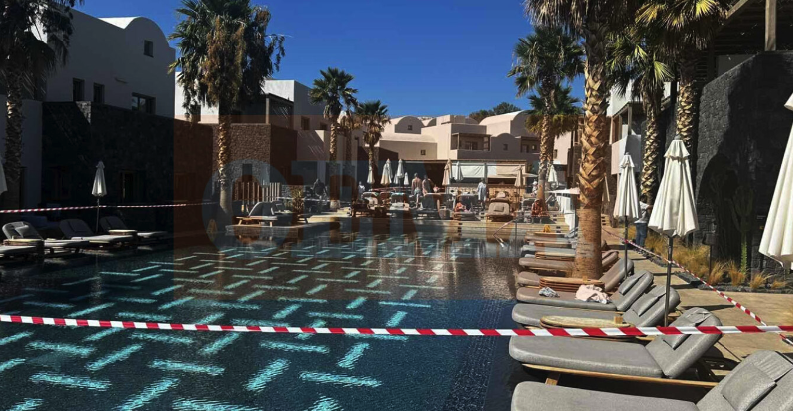Giorgos Leventidis: The student accepted to the University of Bath two years before finish
Source: ProtoThema English
If he chose to, 16-year-old student Giorgos Leventidis could already be studying at one of the UK’s top universities – the University of Bath – two years before finishing high school, as he received an unconditional offer after going through a demanding three-year examination process.
“I’m preparing,” “I’m studying,” “I’m trying” – these are the verbs Giorgos uses most often in conversation with protothema.gr. He’s an exceptional student. Currently in his second year of high school at Zanneio Model High School of Piraeus, he previously attended the 7th Junior High School of Nikaia.
“What led me here was curiosity. I wanted to study mathematics from a very young age – since I was 11. At home, we have a huge library filled with books on math and physics. My father is a professor of mathematics at a major university – EKPA (National and Kapodistrian University of Athens). I guess that’s where I caught the ‘bug’ for math,” he says. “By the age of 13, I was unofficially taking university-level exams at EKPA – and I was passing them, even without attending the lectures, simply because I already knew much of the material.”

The Journey to the University of Bath
Giorgos’s steady academic progress prompted his parents to start researching universities early on.
“For the past three years, I had to study every day for the exams. I was solving problems for two to three hours daily, while also keeping up with schoolwork,” he explains. “To apply to a UK university, you must take a total of 18 exams, each with 10–20 university-level problems to be solved in 90 minutes. Luckily, I already knew a lot of the material, so I didn’t feel too pressured. The syllabus was enormous. In total, I wrote over 1,000 tests during my preparation.”

He adds that letters of recommendation from three teachers played a key role in his application.
“At school, there were issues with absences, since the exams were held only on weekdays. But thankfully, with the support of the school’s staff, we managed to work around it.”

The three-year cycle of 18 exams is a requirement for all applicants to UK universities. Normally, students take these after finishing high school. As his father, Giannis Leventidis, Professor in the Department of Economics at EKPA, explains:
“In England, students finish high school, then go to college and focus exclusively on these exams for two years. Giorgos, on the other hand, took them at a very young age, while still attending regular school and studying all the standard subjects – history, modern Greek, everything. And he’s doing very well in those too, even though Zanneio is full of top-performing students.”
Applications to British universities are submitted via the UCAS platform – with a limit of five choices. The final decision depends on which university offers the best terms.
“I wasn’t accepted at some universities due to my age. But I did receive an unconditional offer from the University of Bath, to study Mathematics and Physics.”
Yes, but…
The acceptance letter from Bath arrived on September 4, while classes were scheduled to start on the 25th. This meant the family had about two weeks to secure a scholarship covering roughly €50,000 in tuition and living expenses – something they couldn’t manage in such a short time.
“Even though I was given this great opportunity, it’s not that simple to start studying there – the amount is overwhelming,” Giorgos notes. “We had to postpone it until we figure things out. If I can secure a scholarship, I’ll be able to go. Still, my first choice would be to study at a top Greek university – like the School of Applied Mathematics and Physical Sciences (SEMFE) at NTUA, or at EKPA, if the Ministry of Education were to accept the results from the exams I already passed for Bath.”
“Having received this international recognition from a top UK university, why shouldn’t I be able to study in my own country?” he asks. “Many students are accepted into top foreign universities with the exams I took.”
“We’ve already sent a letter to the Minister of Education, Ms. Zaharaki, hoping for a solution – and I’m confident she’ll respond,” adds his father.
Though students who excel in math Olympiads often secure direct admission to Greek universities, Giorgos explains why he didn’t follow that path:
“I didn’t take part in math competitions or Olympiads because I focused entirely on the UK university exams. There simply wasn’t enough time to prepare for those too – they’re very time-consuming, on top of all my school obligations.” Going to the UK also comes with major life changes: “I’d need a guardian there. My mom works, and I have a younger brother…”
Balancing School Life
Does a student who’s well beyond the school curriculum and already reading university textbooks get bored in class? “Yes, I get bored,” Giorgos admits. “I either read my own books – advanced math – or I pay a bit of attention to know what homework is assigned, just to participate a bit.” And how do the teachers react? “They appreciate me, especially those in the sciences – especially after what happened with Bath. That’s very important. Sometimes in class, I add comments or we talk during breaks. I’m also part of the Math Club, where we’re working on a group project.”
Do his classmates ever ask for help? “Generally, no. Only some close friends occasionally ask me to check their work.”
Life Beyond Academics

Although math is his passion, Giorgos also tries to maintain a well-rounded life:
“I train in kickboxing three times a week, we go karting, bowling, play football. I love playing pool and table tennis.”
And friends? “I have two or three close friends I trust deeply,” he says.
Plans for the Future
How does 16-year-old Giorgos Leventidis envision his future?
“I plan to complete a PhD in mathematical physics, focusing on cutting-edge topics like plasma behavior modeling in nuclear reactors or quantum computing. After that, I’d like to join a prestigious research group or international institute like CERN. If I manage to stand out, I’d love to become a professor with my own research team.”
His role models? “Many mathematicians… Georg Cantor, Albert Einstein, John Venn, Élie Cartan…” he lists.
Ask me anything
Explore related questions
The original article: belongs to ProtoThema English .



